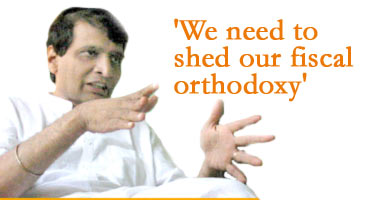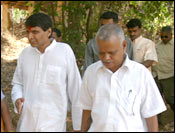Home > Business > Interviews
The Rediff Interview/Suresh Prabhu, MP
May 27, 2004

Part I: 'Politics is the toughest profession'
In this concluding section of a two-part interview, Suresh Prabhu, ex-chairman, Saraswat Bank, former Union minister of power and former chairman of the national commission for the linking of rivers, shares his views on the economy, Business Process Outsourcing, Enron and the project for linking India's rivers with Chief Features Editor Savera R Someshwar.
You have been a politician for about eight years now. What are the issues you feel most strongly about?
There are quite a few of them.
For one, I am convinced that unless you pursue the right economic policies in the country you will not be able to improve the rate of growth. As you have seen in the case of China, the rate of growth gives you an opportunity to raise resources required to address the problems of unemployment, poverty, education, health care and many others.
But growth itself is not enough; it has to be matched with proper social policy. Economic policies can probably guarantee growth, but they do not ensure that social issues are properly addressed. We also need a proper social policy. We have neglected our social infrastructure a great deal in the last five decades. Let us again take the example of China. China's social indices are far better than India's.
To improve our performance here, we should devote the next 10 years to only two areas -- physical infrastructure and social infrastructure. Then, everything will slowly fall into place.
What is the status of the project for linking the nation's rivers?
It is at the stage of planning.
Are you planning any kind of feasibility studies?
The feasibility studies for nine links have already been made.
Can you name these links?
They have been done for nine links.
What are the other studies you are planning?
There are environmental, social and technological studies taking place. Studies are checking out the financial viability of the project. There are studies that are looking at how to handle displacement, if at all it results in that. There are studies to find out how the water quality issues can be addressed. There are about a hundred different studies on different aspects of the project by some of the most reputed institutions in the country.
Which are these institutions?
There's NEERI, there are the IITs, there are the IIMs, the National Council for Applied Economic Research; there are 20 to 25 institutions. There are quite a few institutions doing studies of different aspects of this project to find out financial viability, to study technical feasibility, to study social desirability and also to decide about how to apply it.
Water is a state issue and several states are extremely possessive about their water resources. What are the plans to tackle this?
What we are discussing is not an intra-state issue.
The linking of the rivers…
The intra-state linking of the rivers, in any case, by the Constitution of India, has to be handled by the central government.
Do you envisage any problems at the state level because of this?
If we are not linking the rivers, are there no problems with the states? We are not able to solve those problems so we are thinking of a solution. The Supreme Court thought of a solution of this type because there are intra-state issues that are not being resolved. These issues are not being created because of the linking of the rivers.
Is this one of your pet projects?
For whatever I have handled, people have said the same thing.
There is talk of the Enron project in Maharashtra being revived.
It is a decision the state government has to take. I have maintained from the very beginning that the Maharashtra state government is the one that has to make up its mind as to what price it would like to buy the power because it will ultimately foot the bill.
When I was minister of power, the Maharashtra government constantly maintained we should take over the [Enron] project. I could not understand why the central government should do so. Ultimately, it is the buyer who has to decide if they want to buy power from the project or not.
As former minister for power, what is your considered opinion about this project? Should it be revived?
It is ultimately the state government that has to decide.
You have no opinion about this?
My firm opinion is that the central government should not give any guarantee to any project. It is absolutely wrong to start any power project on guarantee. The guarantee given by the central government was an exception and we discontinued with that policy when I was the minister of power, saying we would not give any guarantee for any new power project. In fact, if at all you need a guarantee, it should be about the commercial viability of the project.
Which is why we started the reform programme, which assures that power will be supplied at reasonable cost to all consumers universally, with assured quality, without any theft and at a reasonable rate. A policy like that is enough guarantee.
A little earlier, you were explaining how China has adopted the right role model for progress as compared to India. But with India becoming the backend office of the world, a lot of money and a lot of jobs are coming in. This is different from what has happened in China. But we are still not concentrating on what you believe are the primary drivers of development. Do you think the kind of economic prosperity that seems to be coming in is sustainable without the kind of development structure that you have outlined?
This is a good question. Let me try and explain.
First of all, what is the structure of the economy today? It is about 50 percent services, about 24 percent agriculture and about 26 per cent manufacturing. That is too small a base of manufacturing. Fifty percent of China's economy is based on manufacturing and its exports are about $325 billion. We really need to increase our share in manufacturing so that we can create more jobs and maintain an ideal balance between services, agriculture and manufacturing.
In manufacturing, too, we need not necessarily do what everybody else is doing. We can concentrate on job-oriented manufacturing where value addition will be the highest in terms of labour. China benefited a lot by concentrating on things like footwear, stuffed toys, electronics and garments. They have created a new model of growth in which they have been able to sustain the manufacturing sector in areas where jobs are created. We must do the same thing here. This will increase our share in manufacturing, create employment and bring about a sense of balance within our lopsided economic structure.
There is a second lesson we can learn from China. People attribute China's success to Deng (Xiaoping) who began the reform process in 1978. In my opinion, Deng launched his economic reforms from the platform of social development, which was laid down by Mao (Xedong) between 1949 and 1978, particularly during the Cultural Revolution. This proves that social development has to precede economic development.
We don't have that choice anymore. We are already late in the day. What we need to do now is to make sure both economic development and social development happen at the same time. The spin-off benefit of social development is tremendous. Therefore, if we invest in education and healthcare, it will add to tremendously to the future growth potential of the economy.
Another dimension of this problem lies in the fact that we have to increase our domestic savings rate substantially. If we want to do that, it's not just household savings that have to increase; in fact household saving are not bad today. What we have to do is make sure the government also saves positively and does not create negative savings rate.
We also need to shed our fiscal orthodoxy and create a new system of budgeting in which capital expenditure is shown separately. Our present plan and non-plan expenditure distribution is really very, very crude. We must move to a much more sophisticated system of accounting. Then we will be able to ensure real capital expenditure, which has the potential to contribute positively towards the economy.
One can even borrow to do that as long as the loan can be serviced properly. By doing so, our growth rate can also increase substantially. But while we do this, we must make sure there is no revenue deficit in the economy.
Today, we are meeting revenue expenditure by borrowing. That's too bad. We really need to move to a more systematic method of accounting to bring in more transparency and simultaneously ensure there is no lop-sided growth of the economy.
My point is India has taken advantage of the outsourcing boom on a much larger scale than China and the money it is bringing is creating a seemingly feel-good situation. Yet, we are not concentrating on infrastructure. Do you think this growth model will work in the long term?
Yes it will. It is working. We should not abandon a good thing. China has already become the workshop of the world and we are now being dubbed as the back office of the world. I think we should not become the back office, I think we should be the frontrunner of development.
There is nothing wrong with BPO. In fact, it is a good model. It is creating jobs. We are attractive right now because of the difference in the cost prevailing in the West and the back offices in India. So as long as that situation prevails, we will grow. But when that situation changes, and it is bound to change with growing demand, we'll lose out.
Therefore we should not put our eggs in one basket. We need to strike a balance even as we concentrate on BPO, where -- according to one estimate, McKinsey I think -- we have not even scratched the surface.
Photographs: Jewella C Miranda. Image: Rahil Shaikh